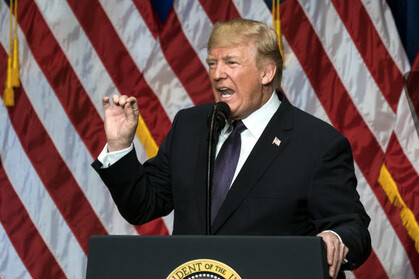hankyoreh
Links to other country sites 다른 나라 사이트 링크
[Editorial] New US national security strategy raises concerns of a return to the Cold War era

The new US national security strategy report released on Dec. 18 by the Donald Trump administration raises concerns that the US may be turning back the clock a half-century to an era of cold wars and confrontation. The report describes China and Russia as “rivals” and talks about how “great power competition [has] returned.” It also states that the two countries “challenge American power, influence, and interests, attempting to erode American security and prosperity.”
It comes across as a warning not to dare challenging the US-centered global order. The report suggests that US is ramping up its efforts to curb Beijing and Moscow to ensure its own dominance – an international version of the “America first” platform Trump ran on in last year’s election.
In the international community, competition among countries is unavoidable. The US and China in particular – the so-called G2 powers – are at odds in a full range of areas, including foreign affairs, national security, and economic matters. But the major powers that are also permanent UN Security Council Members – including the US, China, and Russia – need to be committing their efforts first to cooperation toward global peace and prosperity. This kind of overt reference to each other as “rivals” is extremely worrying for the rest of the world.
The report is packed with rhetoric about reining China in. Trade imbalance issues are denounced in blunt language about the US “no longer turn[ing] a blind eye to violations, cheating, or economic aggression.” This seems to hint at full-scale economic measures to come as the US tries to check China’s rise.
The report further hinted at the possibility of the two countries’ conflict escalating in Asia, claiming that China was attempting to replace the US in Indo-Pacific region and reshape the regional order to suit its own interests. The Trump administration stressed that “unrivaled power is the most certain means of defense,” clearly signaling its hopes of overwhelming China militarily through increased defense spending.
The possibility of a return to the Cold War era is deeply worrying. The New York Times said the strategy “is animated by a single idea: that the world has been on a three-decade holiday from superpower rivalry; and it suggests that that holiday is now over.” As the dust-up over the THAAD deployment showed last year, Washington and Beijing’s conflicts around the Korean Peninsula leave South Korea far worse off. An attempt by the Trump administration build a layered missile defense system with South Korea and Japan to counter North Korea could have serious repercussions on the Northeast Asian political situation.
The report described North Korea as a “rogue regime” and said the US was “ready to respond with overwhelming force.” It did at least avoid making any explicit references to preemptive strikes, preventive war, or other military actions. But the fact that the words “North Korea” appeared no fewer than 17 times in a 68-page report show how high US tensions are over North Korea’s nuclear and missile programs. It’s enough to raise concerns that the Korean Peninsula could very well become the contact point for the US, China, and Russia’s confrontation. In its response to the Trump administration’s warning of a “new Cold War era,” Seoul needs to stay on the alert and manage the crisis carefully.
Please direct questions or comments to [english@hani.co.kr]
Editorial・opinion
![[Editorial] Yoon must halt procurement of SM-3 interceptor missiles [Editorial] Yoon must halt procurement of SM-3 interceptor missiles](https://flexible.img.hani.co.kr/flexible/normal/500/300/imgdb/child/2024/0501/17145495551605_1717145495195344.jpg) [Editorial] Yoon must halt procurement of SM-3 interceptor missiles
[Editorial] Yoon must halt procurement of SM-3 interceptor missiles![[Guest essay] Maybe Korea’s rapid population decline is an opportunity, not a crisis [Guest essay] Maybe Korea’s rapid population decline is an opportunity, not a crisis](https://flexible.img.hani.co.kr/flexible/normal/500/300/imgdb/original/2024/0430/9417144634983596.jpg) [Guest essay] Maybe Korea’s rapid population decline is an opportunity, not a crisis
[Guest essay] Maybe Korea’s rapid population decline is an opportunity, not a crisis- [Column] Can Yoon steer diplomacy with Russia, China back on track?
- [Column] Season 2 of special prosecutor probe may be coming to Korea soon
- [Column] Park Geun-hye déjà vu in Yoon Suk-yeol
- [Editorial] New weight of N. Korea’s nuclear threats makes dialogue all the more urgent
- [Guest essay] The real reason Korea’s new right wants to dub Rhee a founding father
- [Column] ‘Choson’: Is it time we start referring to N. Korea in its own terms?
- [Editorial] Japan’s rewriting of history with Korea has gone too far
- [Column] The president’s questionable capacity for dialogue
Most viewed articles
- 1Months and months of overdue wages are pushing migrant workers in Korea into debt
- 2At heart of West’s handwringing over Chinese ‘overcapacity,’ a battle to lead key future industries
- 3[Editorial] Yoon must halt procurement of SM-3 interceptor missiles
- 4Fruitless Yoon-Lee summit inflames partisan tensions in Korea
- 5Trump asks why US would defend Korea, hints at hiking Seoul’s defense cost burden
- 6Dermatology, plastic surgery drove record medical tourism to Korea in 2023
- 71 in 3 S. Korean security experts support nuclear armament, CSIS finds
- 8[Editorial] New weight of N. Korea’s nuclear threats makes dialogue all the more urgent
- 9South Korea officially an aged society just 17 years after becoming aging society
- 10[Column] For K-pop idols, is all love forbidden love?